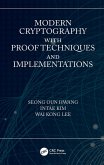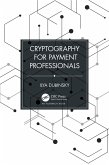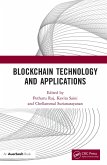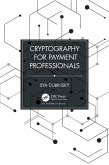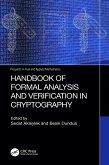Seong Oun Hwang, Intae Kim, Wai Kong Lee
Modern Cryptography with Proof Techniques and Implementations (eBook, PDF)
46,95 €
46,95 €
inkl. MwSt.
Sofort per Download lieferbar

23 °P sammeln
46,95 €
Als Download kaufen

46,95 €
inkl. MwSt.
Sofort per Download lieferbar

23 °P sammeln
Jetzt verschenken
Alle Infos zum eBook verschenken
46,95 €
inkl. MwSt.
Sofort per Download lieferbar
Alle Infos zum eBook verschenken

23 °P sammeln
Seong Oun Hwang, Intae Kim, Wai Kong Lee
Modern Cryptography with Proof Techniques and Implementations (eBook, PDF)
- Format: PDF
- Merkliste
- Auf die Merkliste
- Bewerten Bewerten
- Teilen
- Produkt teilen
- Produkterinnerung
- Produkterinnerung

Bitte loggen Sie sich zunächst in Ihr Kundenkonto ein oder registrieren Sie sich bei
bücher.de, um das eBook-Abo tolino select nutzen zu können.
Hier können Sie sich einloggen
Hier können Sie sich einloggen
Sie sind bereits eingeloggt. Klicken Sie auf 2. tolino select Abo, um fortzufahren.

Bitte loggen Sie sich zunächst in Ihr Kundenkonto ein oder registrieren Sie sich bei bücher.de, um das eBook-Abo tolino select nutzen zu können.
Proof techniques in cryptography are very difficult to understand even for students or researchers who major in cryptography. In addition, in contrast to the excessive emphases on the security proof of the cryptographic schemes, practical aspects of them have received comparatively less attention.
- Geräte: PC
- ohne Kopierschutz
- eBook Hilfe
- Größe: 11.44MB
Andere Kunden interessierten sich auch für
![Modern Cryptography with Proof Techniques and Implementations (eBook, ePUB) Modern Cryptography with Proof Techniques and Implementations (eBook, ePUB)]() Seong Oun HwangModern Cryptography with Proof Techniques and Implementations (eBook, ePUB)46,95 €
Seong Oun HwangModern Cryptography with Proof Techniques and Implementations (eBook, ePUB)46,95 €![Cryptography for Payment Professionals (eBook, PDF) Cryptography for Payment Professionals (eBook, PDF)]() Ilya DubinskyCryptography for Payment Professionals (eBook, PDF)114,95 €
Ilya DubinskyCryptography for Payment Professionals (eBook, PDF)114,95 €![The Security Hippie (eBook, PDF) The Security Hippie (eBook, PDF)]() Barak EngelThe Security Hippie (eBook, PDF)36,95 €
Barak EngelThe Security Hippie (eBook, PDF)36,95 €![Blockchain Technology and Applications (eBook, PDF) Blockchain Technology and Applications (eBook, PDF)]() Blockchain Technology and Applications (eBook, PDF)46,95 €
Blockchain Technology and Applications (eBook, PDF)46,95 €![Advanced Cybersecurity Technologies (eBook, PDF) Advanced Cybersecurity Technologies (eBook, PDF)]() Ralph MoseleyAdvanced Cybersecurity Technologies (eBook, PDF)51,95 €
Ralph MoseleyAdvanced Cybersecurity Technologies (eBook, PDF)51,95 €![Cryptography for Payment Professionals (eBook, ePUB) Cryptography for Payment Professionals (eBook, ePUB)]() Ilya DubinskyCryptography for Payment Professionals (eBook, ePUB)114,95 €
Ilya DubinskyCryptography for Payment Professionals (eBook, ePUB)114,95 €![Handbook of Formal Analysis and Verification in Cryptography (eBook, PDF) Handbook of Formal Analysis and Verification in Cryptography (eBook, PDF)]() Handbook of Formal Analysis and Verification in Cryptography (eBook, PDF)64,95 €
Handbook of Formal Analysis and Verification in Cryptography (eBook, PDF)64,95 €-
-
-
Proof techniques in cryptography are very difficult to understand even for students or researchers who major in cryptography. In addition, in contrast to the excessive emphases on the security proof of the cryptographic schemes, practical aspects of them have received comparatively less attention.
Dieser Download kann aus rechtlichen Gründen nur mit Rechnungsadresse in A, B, BG, CY, CZ, D, DK, EW, E, FIN, F, GR, HR, H, IRL, I, LT, L, LR, M, NL, PL, P, R, S, SLO, SK ausgeliefert werden.
Produktdetails
- Produktdetails
- Verlag: Taylor & Francis eBooks
- Seitenzahl: 528
- Erscheinungstermin: 28. März 2021
- Englisch
- ISBN-13: 9781000364507
- Artikelnr.: 61209834
- Verlag: Taylor & Francis eBooks
- Seitenzahl: 528
- Erscheinungstermin: 28. März 2021
- Englisch
- ISBN-13: 9781000364507
- Artikelnr.: 61209834
- Herstellerkennzeichnung Die Herstellerinformationen sind derzeit nicht verfügbar.
Seong Oun Hwang received the BS degree in Mathematics in 1993 from the Seoul National University, the MS degree in Computer and Communications Engineering in 1998 from the Pohang University of Science and Technology, and the PhD degree in Computer Science from the Korea Advanced Institute of Science and Technology. He worked as a software engineer at the LG-CNS Systems, Inc. from 1994 to 1996. He worked as a senior researcher at the Electronics and Telecommunications Research Institute (ETRI) from 1998 to 2007. Since 2008, he has been working as an associate professor with the Department of Computer and Information Communication Engineering, Hongik University, Korea. His research interests include cryptography, cyber security and mobile network. He is a member of IEEE and IEEE Communications Society. He is also a lifelong member of IEEK (Institute of Electronics and Information Engineers) and KIISC (Korea Institute of Information Security and Cryptology). He has served as a director in IEEK Computer Society and led the Commission of Information Security in the IEEK Computer Society. He has led ICGHIT, one of the famous international conferences as an organizing chair. He has been an editor at ETRI Journal, International Journal of Advanced Research in Computer and Information Security, International Journal of Software Engineering, and Journal of Security Engineering Research Support Center. As an guest editor, he served a lot of journals including Journal of Intelligent and Fuzzy System, Springer's Lecture Notes in Electrical Engineering, International Journal of Computational Vision and Robotics, International Journal of Internet Technology and Secured Transactions. He has also been the reviewers for international journals such as IEEE Computer, IEEE Transactions on Dependable and Secure Computing, Security and Communications Network, Journal of Communications and Networks, Journal of Systems and Software, Nonlinear Dynamics, Computer and Communications, Wireless Personal Communications, and so on. He has authored three books on information security and its applications. He also published a lot of outstanding research papers on information security in premium journals such as IEEE Transactions on Computers and IEEE Transactions on Broadcasting.
Intae Kim is an associate research fellow at the Institute of Cybersecurity and Cryptology, University of Wollongong, Australia. He received the Ph.D. degree in electronics and computer engineering from Hongik University, Korea. His research interests include cryptography, cybersecurity, and networks.
Wai Kong Lee is an assistant professor in UTAR (University Tunku Abdul Rahman), Malaysia. He received the Ph.D. degree in engineering from UTAR, Malaysia. In between 2009 - 2012, he served as an R&D engineer in several multinational companies including Agilent Technologies (now known as Keysight) in Malaysia. His research interests include cryptography engineering, GPU computing, numerical algorithms, Internet of Things (IoT) and energy harvesting.
Intae Kim is an associate research fellow at the Institute of Cybersecurity and Cryptology, University of Wollongong, Australia. He received the Ph.D. degree in electronics and computer engineering from Hongik University, Korea. His research interests include cryptography, cybersecurity, and networks.
Wai Kong Lee is an assistant professor in UTAR (University Tunku Abdul Rahman), Malaysia. He received the Ph.D. degree in engineering from UTAR, Malaysia. In between 2009 - 2012, he served as an R&D engineer in several multinational companies including Agilent Technologies (now known as Keysight) in Malaysia. His research interests include cryptography engineering, GPU computing, numerical algorithms, Internet of Things (IoT) and energy harvesting.
Part 1: Foundations of Cryptography.
1. History of Cryptography.
2. Overview of Provable Security.
3. Private Key Encryption.
4. Message Authentication Code.
5. Hash Function.
6. Public Key Cryptography.
7. Digital Signature.
8. Protocols.
Part 2: Fundamentals of IBE.
9. First Provable IBE (Boneh-Franklin).
10. Selective Security IBE (Boneh-Boyen).
11. Tight Security IBE (Gentry IBE).
12. Dual System Encryption (Waters).
13. Hierarchical IBE (Allison-Waters).
14. Broadcast Encryption.
15. Identity Based Signature.
16. Transformation Techniques.
Part 3: Advanced IBE.
17. Key Policy-Attribute Based Encryption.
18. Ciphertext Policy-Attribute Based Encryption.
19. Predicate Encryption.
20. Functional Encryption.
21. Searchable Encryption.
Part 4: Future Cryptography.
22. Certificate Based Cryptography.
23. Certificate-Less Cryptography.
24. Homomorphic Encryption.
25. Post Quantum Cryptography.
26. Blockchain Applications.
1. History of Cryptography.
2. Overview of Provable Security.
3. Private Key Encryption.
4. Message Authentication Code.
5. Hash Function.
6. Public Key Cryptography.
7. Digital Signature.
8. Protocols.
Part 2: Fundamentals of IBE.
9. First Provable IBE (Boneh-Franklin).
10. Selective Security IBE (Boneh-Boyen).
11. Tight Security IBE (Gentry IBE).
12. Dual System Encryption (Waters).
13. Hierarchical IBE (Allison-Waters).
14. Broadcast Encryption.
15. Identity Based Signature.
16. Transformation Techniques.
Part 3: Advanced IBE.
17. Key Policy-Attribute Based Encryption.
18. Ciphertext Policy-Attribute Based Encryption.
19. Predicate Encryption.
20. Functional Encryption.
21. Searchable Encryption.
Part 4: Future Cryptography.
22. Certificate Based Cryptography.
23. Certificate-Less Cryptography.
24. Homomorphic Encryption.
25. Post Quantum Cryptography.
26. Blockchain Applications.
Part 1: Foundations of Cryptography.
1. History of Cryptography.
2. Overview of Provable Security.
3. Private Key Encryption.
4. Message Authentication Code.
5. Hash Function.
6. Public Key Cryptography.
7. Digital Signature.
8. Protocols.
Part 2: Fundamentals of IBE.
9. First Provable IBE (Boneh-Franklin).
10. Selective Security IBE (Boneh-Boyen).
11. Tight Security IBE (Gentry IBE).
12. Dual System Encryption (Waters).
13. Hierarchical IBE (Allison-Waters).
14. Broadcast Encryption.
15. Identity Based Signature.
16. Transformation Techniques.
Part 3: Advanced IBE.
17. Key Policy-Attribute Based Encryption.
18. Ciphertext Policy-Attribute Based Encryption.
19. Predicate Encryption.
20. Functional Encryption.
21. Searchable Encryption.
Part 4: Future Cryptography.
22. Certificate Based Cryptography.
23. Certificate-Less Cryptography.
24. Homomorphic Encryption.
25. Post Quantum Cryptography.
26. Blockchain Applications.
1. History of Cryptography.
2. Overview of Provable Security.
3. Private Key Encryption.
4. Message Authentication Code.
5. Hash Function.
6. Public Key Cryptography.
7. Digital Signature.
8. Protocols.
Part 2: Fundamentals of IBE.
9. First Provable IBE (Boneh-Franklin).
10. Selective Security IBE (Boneh-Boyen).
11. Tight Security IBE (Gentry IBE).
12. Dual System Encryption (Waters).
13. Hierarchical IBE (Allison-Waters).
14. Broadcast Encryption.
15. Identity Based Signature.
16. Transformation Techniques.
Part 3: Advanced IBE.
17. Key Policy-Attribute Based Encryption.
18. Ciphertext Policy-Attribute Based Encryption.
19. Predicate Encryption.
20. Functional Encryption.
21. Searchable Encryption.
Part 4: Future Cryptography.
22. Certificate Based Cryptography.
23. Certificate-Less Cryptography.
24. Homomorphic Encryption.
25. Post Quantum Cryptography.
26. Blockchain Applications.
Part 1: Foundations of Cryptography.
1. History of Cryptography.
2. Overview of Provable Security.
3. Private Key Encryption.
4. Message Authentication Code.
5. Hash Function.
6. Public Key Cryptography.
7. Digital Signature.
8. Protocols.
Part 2: Fundamentals of IBE.
9. First Provable IBE (Boneh-Franklin).
10. Selective Security IBE (Boneh-Boyen).
11. Tight Security IBE (Gentry IBE).
12. Dual System Encryption (Waters).
13. Hierarchical IBE (Allison-Waters).
14. Broadcast Encryption.
15. Identity Based Signature.
16. Transformation Techniques.
Part 3: Advanced IBE.
17. Key Policy-Attribute Based Encryption.
18. Ciphertext Policy-Attribute Based Encryption.
19. Predicate Encryption.
20. Functional Encryption.
21. Searchable Encryption.
Part 4: Future Cryptography.
22. Certificate Based Cryptography.
23. Certificate-Less Cryptography.
24. Homomorphic Encryption.
25. Post Quantum Cryptography.
26. Blockchain Applications.
1. History of Cryptography.
2. Overview of Provable Security.
3. Private Key Encryption.
4. Message Authentication Code.
5. Hash Function.
6. Public Key Cryptography.
7. Digital Signature.
8. Protocols.
Part 2: Fundamentals of IBE.
9. First Provable IBE (Boneh-Franklin).
10. Selective Security IBE (Boneh-Boyen).
11. Tight Security IBE (Gentry IBE).
12. Dual System Encryption (Waters).
13. Hierarchical IBE (Allison-Waters).
14. Broadcast Encryption.
15. Identity Based Signature.
16. Transformation Techniques.
Part 3: Advanced IBE.
17. Key Policy-Attribute Based Encryption.
18. Ciphertext Policy-Attribute Based Encryption.
19. Predicate Encryption.
20. Functional Encryption.
21. Searchable Encryption.
Part 4: Future Cryptography.
22. Certificate Based Cryptography.
23. Certificate-Less Cryptography.
24. Homomorphic Encryption.
25. Post Quantum Cryptography.
26. Blockchain Applications.
Part 1: Foundations of Cryptography.
1. History of Cryptography.
2. Overview of Provable Security.
3. Private Key Encryption.
4. Message Authentication Code.
5. Hash Function.
6. Public Key Cryptography.
7. Digital Signature.
8. Protocols.
Part 2: Fundamentals of IBE.
9. First Provable IBE (Boneh-Franklin).
10. Selective Security IBE (Boneh-Boyen).
11. Tight Security IBE (Gentry IBE).
12. Dual System Encryption (Waters).
13. Hierarchical IBE (Allison-Waters).
14. Broadcast Encryption.
15. Identity Based Signature.
16. Transformation Techniques.
Part 3: Advanced IBE.
17. Key Policy-Attribute Based Encryption.
18. Ciphertext Policy-Attribute Based Encryption.
19. Predicate Encryption.
20. Functional Encryption.
21. Searchable Encryption.
Part 4: Future Cryptography.
22. Certificate Based Cryptography.
23. Certificate-Less Cryptography.
24. Homomorphic Encryption.
25. Post Quantum Cryptography.
26. Blockchain Applications.
1. History of Cryptography.
2. Overview of Provable Security.
3. Private Key Encryption.
4. Message Authentication Code.
5. Hash Function.
6. Public Key Cryptography.
7. Digital Signature.
8. Protocols.
Part 2: Fundamentals of IBE.
9. First Provable IBE (Boneh-Franklin).
10. Selective Security IBE (Boneh-Boyen).
11. Tight Security IBE (Gentry IBE).
12. Dual System Encryption (Waters).
13. Hierarchical IBE (Allison-Waters).
14. Broadcast Encryption.
15. Identity Based Signature.
16. Transformation Techniques.
Part 3: Advanced IBE.
17. Key Policy-Attribute Based Encryption.
18. Ciphertext Policy-Attribute Based Encryption.
19. Predicate Encryption.
20. Functional Encryption.
21. Searchable Encryption.
Part 4: Future Cryptography.
22. Certificate Based Cryptography.
23. Certificate-Less Cryptography.
24. Homomorphic Encryption.
25. Post Quantum Cryptography.
26. Blockchain Applications.

